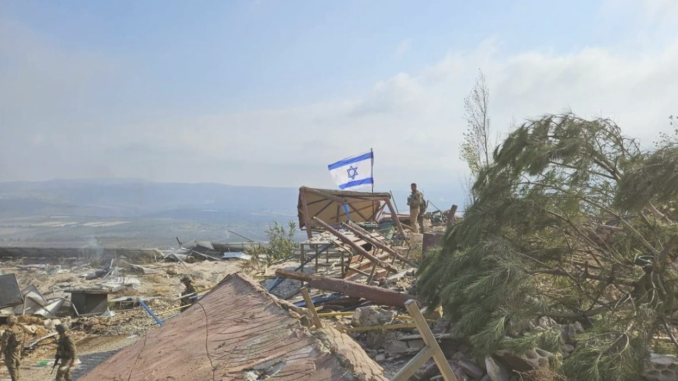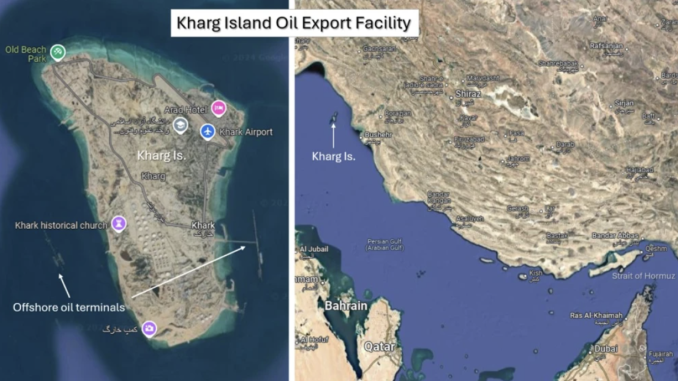Preempt what you can’t sufficiently defend.
J.E. Dyer, a retired Naval Intelligence officer, blogs as The Optimistic Conservative, October 10, 2024
 The flag of Israel, raised on 8 October 2024, flies over the Lebanese town of Maroun al-Ras, from which many rockets have been launched into Israel since 7 October 2023. Via X (Twitter).
The flag of Israel, raised on 8 October 2024, flies over the Lebanese town of Maroun al-Ras, from which many rockets have been launched into Israel since 7 October 2023. Via X (Twitter).
The short summary of where we are in the war of Iran’s proxies on Israel is as follows.
Israel continues to degrade Hezbollah and force its concentrations out of southern Lebanon. This involves IDF ground operations, and air strikes (tactical aircraft, drones, and missiles) in Lebanon and Syria. Israel continues to clear Hamas out of Gaza, largely with ground operations now, and supported by air activity where needed.
Hezbollah continues to launch rockets, drones, and short-range missiles at Israel. On Tuesday 1 October 2024, Iran launched a massed barrage of 180 missiles at Israel, saturating Israel’s missile defenses and achieving more than two dozen hits on Israeli territory.
The UK Telegraph characterized the 1 October attack as the largest missile event ever perpetrated, and the paper is right about that. It’s important to remember that, because what it showed is not that Israel’s “Iron” missile defenses were mistakenly made inadequate, or that missiles could leak through to an unanticipated degree. It showed rather that, as all sensible analysts would recognize, at a certain point the best missile defense can be overwhelmed with a saturation barrage.
We’ll take into account a few more conditions of the current moment, and then make the headline point.
Obviously, Israel doesn’t want to live with missile “leakage” that would put its population in increasing danger. The Telegraph is somewhat fatuous in its tacit acceptance of Iran’s claim that on 1 October, it aimed to hit only military targets. There is no reason to credit the Iranian regime with purity of intention or honesty of claim. But the Telegraph makes an otherwise valid point that continuing missile attacks from Iran, regardless of what Iran claims to be targeting, will put Israeli civilians more and more at risk. What, Telegraph implicitly wonders, is Israel to do?
Many commentators are focusing on what Israel could achieve with counterstrikes that would meet the test of proportionality, but focus on Israeli war aims rather than on one-off, tit-for-tat retaliation.
Mere retaliation would entail some stupidity such as aiming for a “proportionate” number of military bases in Iran, or counting missiles and setting a number of missile launches as the measure of proportion.
That’s why “retaliation” is the wrong word to start with, and what Israel wants is a “reprisal” attack. Reprisal literally means “retaking,” and it refers to taking back the initiative, and striking for, precisely, Israel’s own war aims. A reprisal could very usefully include, for example, striking Iran’s proxy and logistic infrastructure in Syria and Iraq, as well as striking Iran.
Observers also point out that attacking Iran’s oil and gas facilities would cripple the bone and muscle of Iran’s economic body. The revenues from that sector finance the terrorism, arms development, and warmaking of Iran’s radical regime.
The singularly significant and perfectly concentrated, perfectly exposed oil export facility on Kharg Island, through which 90% of Iran’s crude oil exports flow, is a popular choice.
 For all images and graphics, click to enlarge for legibility. Google satellite image; author annotation
For all images and graphics, click to enlarge for legibility. Google satellite image; author annotation
In fact, oil tankers have reportedly vacated the island in the last week, in anticipation of a strike.
Likewise, imagery from late last week showed an apparent dispersal of Iran’s naval forces from the main base at Bandar Abbas, a very unusual turn of events. Iran seems to have had (and may still have) a serious expectation of being attacked in the obvious locations.
And, of course, many observers advocate Israel attacking Iran’s nuclear program facilities. Now is the time, in their view. The purpose of this article isn’t to inspect that point, and we can save it for comments or a later article.
The purpose here is rather to take a larger view: to see where we are in the overall war, and take into account the major influences on it.
Ceasefire, ceasefire Über alles
An especially important one is the endlessly recurring them of seeking a “ceasefire,” an enterprise pursued doggedly by third parties. Among them, the most persistent by far is the Biden administration. No matter what is going on, no matter how successfully Israel is degrading its terrorist enemies and improving its prospect of stable security as an end-state, Washington prefers a halt to Israeli success with a ceasefire, and the implication of a return to the status quo ante bellum. The Biden team would rather have terrorists return to their preexisting lairs to menace Israel than see the terrorists defeated and Israel unmenaced in that way.
The latest major movement in this regard is apparently conveyed in a report that the U.S. is working with Arab nations to start, without Israel’s participation, a ceasefire dialogue with Iran. America isn’t involved directly in the talks, but is said to be in on them.
Meanwhile, a surviving (so far) Hezbollah official, Naim Qassem, stated in a recent video address that Hezbollah “supports the ceasefire initiative of [its] big brother, Nabih Berri” (the speaker of the Lebanese parliament). Hezbollah thus signals a willingness to treat for a ceasefire.
I made comments in separate correspondence on that a few days ago:
The timing would be disadvantageous for Israel, but advantageous for Iran, and I assume that’s why the “offer” has been put out there. The offer would be basically for the Biden admin to seize on and try to force Israel to accept.
Hezbollah getting a ceasefire wouldn’t bring any hostages home for Israel or the US. But it would buy Iran time and preempt any plan Israel has for a counterattack on Iran.
It’s a bad deal for Israel, which I assume Netanyahu sees. Holding out against Biden & Co. is another story.
And:
I think it’s wrong to read any of this as an independent “Lebanese” initiative. Iran is spooked about the potential for an Israeli attack, and Hezbollah would no doubt find a ceasefire very convenient. At any given time, Lebanon is likely to prefer a ceasefire to continuing bombardment, but is certainly not in the lead on such a matter.
It works out well for Iran and Hezbollah to frame it as a Lebanese initiative that would then implicitly be taken up by the Biden admin. Hezbollah doesn’t have the bargaining chips Hamas has, and benefits from the appearance that the ceasefire is being negotiated with Lebanon.
If the US has sense, we’d condition any pressure exerted with Israel on Lebanon agreeing to cooperate in implementing UNSCR 1701.
I’ve seen no reason to revise these remarks. Hezbollah is on its heels in Lebanon, as Hamas is in Gaza. That puts Iran on its heels in the region, with its ability to threaten Irael from geographically privileged positions disappearing before our eyes.
The remaining players that speak with a coherent voice are looking for a ceasefire as a means of regaining breathing room and salvaging something from the comprehensive damage Israel is inflicting with “what Netanyahu won’t stop doing.”
As I laid it out on 29 September, Netanyahu won’t stop fighting to win the war: to defeat the enemy, and create the conditions for a better peace.
What to do next



The so-called proportionality being demanded is out of line with any kind of calculation. Based on area, for example, Israel would need to wall-to-wall carpet bomb the whole of Iran. Not feasible.
“Proportionality” is a ridiculous term when used to describe a strategy against an enemy who wishes to exterminate your country and your people. Israel must use everything it has to take out Iran’s capabilities, and do it now, while there is time and when the world still remembers the atrocities committed against her. I hope and pray Israel will do everything necessary to neutralize Iran’s capabilities and to defend her people.